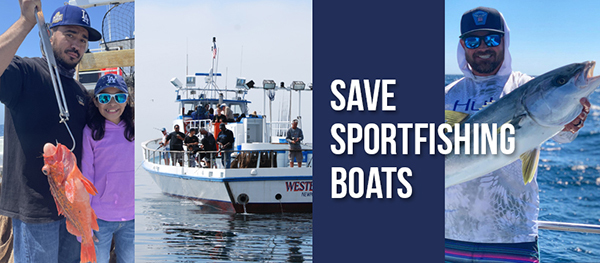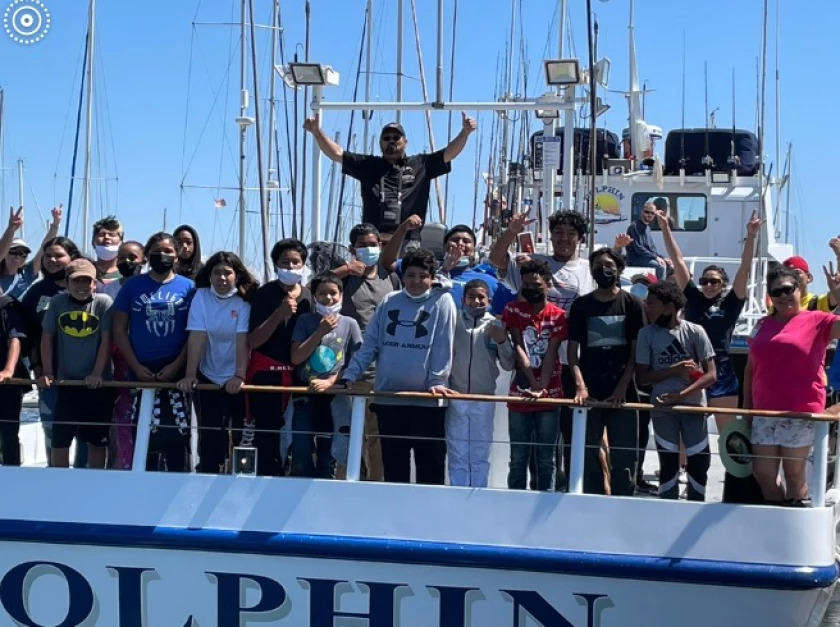From Sportfishing
Fish Report for 10-9-2021

Column: San Diego fishing fleet, others fight back as regulations continue to threaten industry
10-9-2021
Ken Franke
At-risk kids, military veterans, tourists among those who could be negatively impacted
As the founder and executive director of Good Neighbor Project in Logan Heights, John Alvarado has experienced how boarding a boat, landing a fish and breathing crisp ocean air can forever change the trajectory of lives.
He’s watched young gang members, not yet old enough to shave, rethink perilous paths they thought had been poured in quick-dry concrete. He’s seen them joyfully throw anchovies in the air to circling seagulls, as the weight of the world melts away.
So, it’s understandable — personal, even — when Alvarado talks about the dire impacts of pending emission regulations from the California Air Resources Board that threaten the existence of the San Diego sportfishing fleet and scores of business along that unique and essential food chain.
“Being an at-risk youth myself, being in nature had a therapeutic effect on my life, so much so that it changed the direction of my life,” he said. “There are people who live a mile from the water’s edge who have never been on the ocean, never been on a boat.
“We can make a difference in the lives of kids. I’ve seen. I’ve lived it.”
That’s the danger posed by inflexible bureaucracy lacking the want or will to explore sensible middle ground related to something that endangers educational programs for kids, crucial experiences for military veterans with PTSD and vital tourism dollars from bay tours and whale watching.
As CARB attempts to hit clean-air benchmarks — which everyone agrees are important — they’ve targeted one of the smaller vessel groups in that ecosystem, produced an unreasonable timeline, failed to commit to grant programs that would help the fleet comply and required engine technology that (wait for it) does not currently exist for this class of boats and, as a worrisome result, lacks safety testing.
For older boats, which can constitute the majority in many ports, the still-unproduced engines likely cannot be retrofitted. The answer, according to CARB, is to buy new multimillion-dollar vessels as decades worth of investment evaporate.
The solution, according to CARB: Pass the costs on to customers. That’s like assigning a business-killing charge to restaurants, shrugging, and telling them to charge $50 for a hamburger. Cue the tumbleweeds.
Memo to Sacramento and Gov. Gavin Newsom: All those families and businesses are not going down without a fight.
This week, groups supporting the cause (savefishing.com) fired off more than 20,000 signatures opposing the current air-regulation plan to the capital. They’ve secured the support of 21 chambers of commerce and travel bureaus dotting the California coastline. Lobbyists are filling hallways.
Included in that push are chamber groups in Dana Point, San Clemente and Oceanside, along with the San Diego Regional Chamber of Commerce.
“Its impact is (several hundred million dollars), just in San Diego,” said San Diego chamber head and former Mayor Jerry Sanders. “I used to think it was all wealthy white guys who did this. When I go down there, all of San Diego is there. The diversity was striking.
“The CARB stands make no sense whatsoever. The technology doesn’t exist. If you can’t use those boats and you can’t comply with the law because there’s no fix for that, it just dies.
“It’s a case of rule makers who don’t understand what the issue is. I don’t think they really care how it impacts small businesses. It’s thrown the whole industry in turmoil.”
Strong words, wisely and deservedly delivered.
Access to California’s coastal waterways comes, for many, from the generosity of sportfishing fleets who simply want to share an experience so central to their lives and livelihoods.
The Captain Rollo’s Kids at Sea program alone has exposed an estimated 140,000 children to marine opportunities and stewardship responsibilities since 1999. The San Diego-based Sportfishing Association of California has partnered countless times with groups to do the same. And on and on.
Two years ago, I wrote a column about veterans fighting PTSD who fished about the Fisherman III out of H&M Landing in San Diego.
Here’s what I heard: “It’s a chance to leave your problems back there (on land).” “It distracts me from the bad things in life.” “You tend to isolate yourself. This is a blessing, since many of us can’t normally afford to do this.”
That all could be gone, simply because land-locked offices refuse to consider thoughtful and empathetic compromise.
Bonnie Soriano, a branch supervisor for CARB, told the Union-Tribune in July that the group felt caught in the middle of passionate arguments from environmentalists and those in a critical coastal industry.
“We have environmental groups that are pushing us to require zero emission from every harbor craft,” Soriano said. “We’ve worked with the industry to work on flexibility (and) coming to a middle ground based on what’s feasible and … what we feel that the economics could support.”
Plenty of debate about middle ground remains.
This isn’t a stubborn all-or-nothing stand from families and small businesses who comprise the bulk of the fleet. Instead of the soon-required Tier 4 engines not yet available, fishermen suggested an improvement push to Tier 3 engines that exist for that boat class while not sinking operations.
“Financially, we’re not even out of COVID,” said Ken Franke, president of the Sportfishing Association of California. “The industry is very fragile right now. The timing of this is quite poor. They’re doing everything they can, upgrading to a better grade of fuel from the last requirements. People have been upgrading engines.
“Now, they’re saddling them with such a difficult, difficult bar to reach. It creates an incredible stress on all these people.”
There are family-owned boats of generational owners who are counting on selling the operations to fund retirements. If the current regulations stand, boats that are impossible to retrofit essentially would become worthless.
“When a hot water heater goes out, you don’t tear down the whole house,” Franke said. “If we could say one thing to CARB and the governor, our message is the same since Day 1. Work with us to find something that’s attainable.”
Public comment to CARB opened a week ago and closes Nov. 8. A public hearing is set for Nov. 19.
Sanders, the former San Diego mayor, shared a snapshot from his life.
“We’d go on the half-day boats as a kid in Long Beach,” he said. “My parents would drop us off at the dock and we’d have a blast. I worry about how many kids won’t get that opportunity if this industry doesn’t survive.”
No need to tell Alvarado.
“It’s amazing what being on the water can do for a young person,” he said.
Hopefully, that’s never a thing of the past.
< Previous Report Next Report >
More Reports

10-4-2021
This month could mark the beginning of the end for passenger sportfishing and whale watching boats! Boat crews and their families...... Read More

10-2-2021
As the founder and executive director of Good Neighbor Project in Logan Heights, John Alvarado has experienced how boarding a boat, landing...... Read More

Website Hosting and Design provided by TECK.net